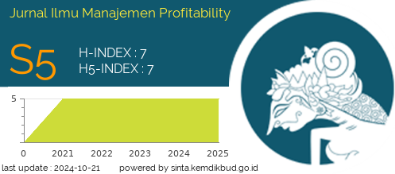Implementasi Program Corporate Social Responsibility (CSR) dan Dampaknya Terhadap Kinerja Keuangan PT.Buana Sanjaya di Papua Barat
DOI: https://doi.org/10.26618/profitability.v3i1.2500
Abstract
This study aims to find out the implementation and accountability that has been done by the company towards the community in the company environment so that it can contribute directly to the community and profit profits for companies that affect the impact of the financial performance of PT. Buana Sanjaya in West Papua. Data collection techniques used in this study are interviews and observations. This type of research is quantitative descriptive using a sampling technique that is purposive sampling. Data samples were obtained from the company's annual report from 2013 to 2017. The data obtained were analyzed using statistics, namely using simple regression. The results of this study indicate that the implementation of corporate social responsibility (CSR) programs has a positive and significant effect on financial performance at PT. Buana Sanjaya in West Papua. This can be seen from the linear regression equation as follows: KEU = -0.849 + 4.604 CSR with a significance value t = 0.011 <0.05 and the determinant coefficient (R2) 0.913 or 91.3%.
References
Fahmi, Irham. 2011. Analisis Laporan Keuangan. Bandung : Alfabeta.
Kusumanegara. 2010. Model Dan Aktor Dalam Proses Kebijakan Publik. Gava Media.
Kasmir. 2016. Manajemen Sumber Daya Manusia (Teori Dan Praktik). Depok : Pt. Rajagrafindo Persada.
Mazmanian Dan Sebastiar. 2008. Implementation And Policy. Usa : Scott, Foreman And Company.
Marwansyah. 2010. Manajemen Sumber Daya Manusia Edisi Kedua. Bandung : Alfabeta.
Prastowo. 2011. Corporate Social Responsibility. Samudra Biru.
Rahman, A., & Rasulong, I. (2015). Empowerment Of Creative Economy To Improve Community Incomes In Takalar Regency. Iosr Journal Of Business And Managementver, 17(4), 2319-7668.
Rasulong, I. (2011). Faktor Penentu Motivasi Dan Kepuasan Kerja Karyawan Di Universitas Muhammadiyah Makassar. B Alance, 7(2), 51.
Rasulong, I. (2012). Implikasi Dana Perimbangan Terhadap Pertumbuhan Ekonomi Dan Dampaknya Terhadap Pendapatan Asli Daerah Kabupaten Takalar. Jeb, 8(2).
Rahim, A. R., Rasulong, I., Jusriadi, E., & Adzim, F. (2016). Strategi Implementasi Model Pengembangan Wirausahawan Muda Bagi Masyarakat Pesisir Kabupaten Takalar. Balance, 14(02).
Rasulong, I. (2011). Pemahaman Nasabah Tentang Konsep Mudharabah (Studi Pada Bmt Ditha Anugerah Abadi Makassar). Jurnal Ekonomi Balance, 7(1), 32-42.
Rusydi, M., & Rasulong, I. (2009). Dampak Kredit Rentenir Terhadap Keuntungan Usaha Pagandeng Sayur Di Kecamatan Pallangga Kabupaten Gowa. Jurnal Ekonomi Balance, 5(2), 159-167.
Rasulong, I., & Asdi, M. A. S. Model Pengembangan Wirausahawan Muda Bagi Masyarakat Pesisir Kabupaten Takalar
Prastowo, Jko Dan Huda. 2011. Corporate Social Responsibility. Samudra Biru.
Rahman, Reza. 2009. Corporate Social Responsibility Antara Teori Dan Kenyataan. Jakarta : Buku Kita.
Restuniary. 2011. Corporate Social Responsibility.Surabaya.
Sutrisno. 2009. Imanajemen Keuangan Teori, Konsep Dan Aplikasi, Edisi Pertama, Cetakan Ketujuh. Yogyakarta.
Subramanyam, Kr Dan John, J. Wild. 2010. Analisis Laporan Keuangan, Buku Satu, Edisi Sepuluh. Salemba Empat, Jakarta.
Winarno. 2012. Kebijakan Publik, Teori, Proses, Dan Studi Kasus Edisi & Revisi Terbaru. Caps. Yogyakarta.
Wibisono. 2007. Cannibals With Fork, The Triple Bottom Line Of Twentieth Century Business. Jakarta.
Wirawan. 2009. Evaluasi Kinerja Sumber Daya Manusia : Teori Aplikasi Dan Penelitian. Jakarta: Salemba Empat.
Downloads
Published
Issue
Section
License
Authors who publish with Jurnal Ilmu Manajemen Profitability agree to the following terms:
Copyright of the articles remains with the authors.
Authors grant the journal the right of first publication with the work simultaneously licensed under a Creative Commons Attribution-NonCommercial 4.0 International License (CC BY-NC 4.0). This license allows others to:
Share (copy and redistribute the material in any medium or format)
Adapt (remix, transform, and build upon the material)
as long as they give appropriate credit to the original author(s) and source, provide a link to the license, and indicate if changes were made. Non-commercial use only.
Authors are permitted to:
Distribute their published work (e.g., post it to an institutional repository or publish it in a book), with an acknowledgment of its initial publication in this journal.
Enter into separate, additional contractual arrangements for the non-exclusive distribution of the journal’s published version of the work (e.g., post it to a class website or institutional archive).
For permissions to use the content published in this journal beyond the scope of the license (e.g., commercial purposes), please contact the editorial office via the journal email.
License Details:
This journal is licensed under a Creative Commons Attribution-NonCommercial 4.0 International License (CC BY-NC 4.0).












